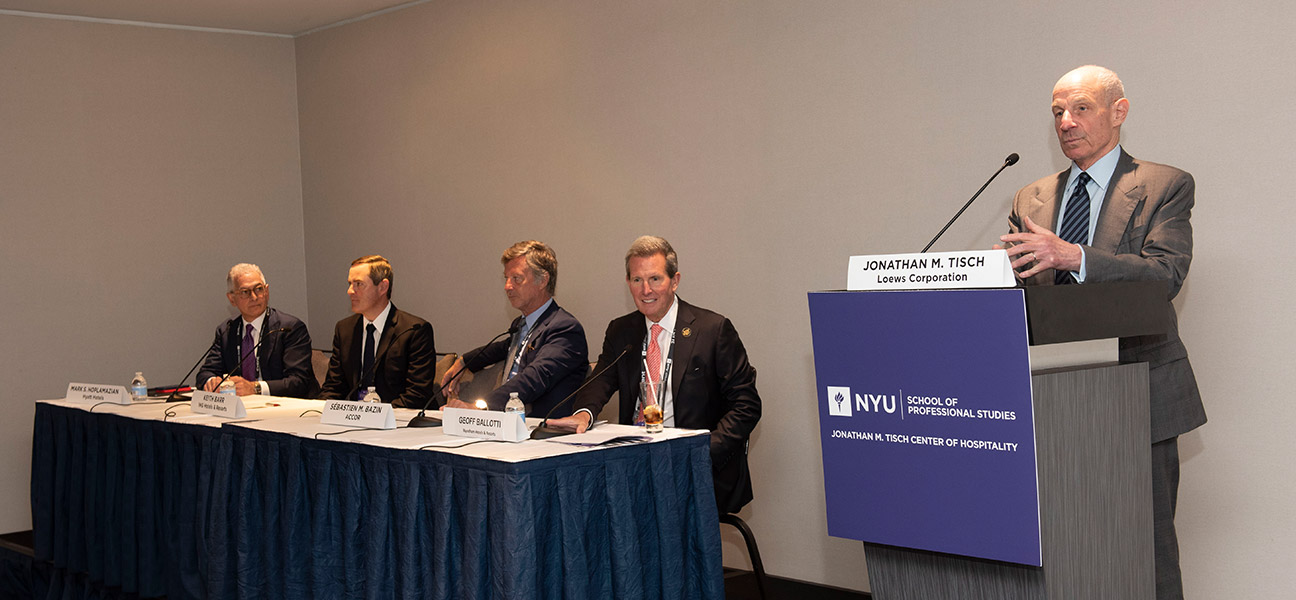At the 45th annual NYU International Hospitality Industry Investment Conference, held at the New York Marriott Marquis, CEOs gathered for the Coffee Talk press event to discuss the pulse of the industry.
Jonathan M. Tisch, executive chairman, Loews Hotels & Co/co-chairman of the board, Loews Corporation, guided the discussion, which also featured Geoff Ballotti, president/CEO, Wyndham Hotels & Resorts; Sébastien M. Bazin, chairman/CEO, Accor; Keith Barr, CEO, IHG Hotels & Resorts; and Mark S. Hoplamazian, president/CEO, Hyatt Hotels Corporation.
The conversation began around the workforce and the need for labor across the industry. Hospitality has enjoyed temporary work visas, which, however, over time, have become more difficult to get.
“Ultimately, the fact is that it’s caught up in the political equation as opposed to a commercial equation,” Hoplamazian said. “The commercial equation is that there’s a huge demand for jobs during the summer peak season and a lot of the types of jobs, the jobs that are most in need, are not jobs that you find Americans flocking to. As a consequence, we end up short-staffed. What’s needed is immigration reform and that has been something that’s been pursued for at least the last 30 years. There’s been nothing to show for it at this point.”
Although there hasn’t been much progress in this area, the panel does remain optimistic in regard to travel and development.
Barr said that the industry is having constructive conversations, and since deferring PIPs and maintenance, now has to perform in a thoughtful way to deliver great customer service for the long-term.
“The health of the brands is dependent upon the consistent quality and guest experience,” Barr said. “We have more PIPs underway in the U.S. now than we ever had in the history of the company. It’s great for customers, great for owners in the long-term.”
Developers are certainly embracing the extended-stay model and are also turning to conversions, especially of independent properties.
“The world is a very big place, outside of the U.S., over half the hotels in existence are without a brand,” Ballotti noted.”The one thing all of us know is that brands, especially in a downturn, outperform independent hotels. Conversion activity for all of us is high.”
And it’s not that new development has gone to zero, Hoplamazian pointed out. In fact, about 40% of the hotels in Hyatt’s pipeline are under construction now.
“Beginning construction has gone down significantly in the U.S. primarily because of credit. Even as credit becomes harder to find and more expensive property results continue to improve. So at some point, the line crosses and developers say, ‘I’ve got to figure out a way to get a shovel in the ground because this lack of new supply can evolve to my benefit.’ Developers are getting more creative and resourceful.”
Ballotti said that developers believe that we’re at the very early start of the cycle.
“The cycle in their minds ended in 2019, so the sooner the better developers can start. They’re thinking there’s never been a better time for a multi-year runway standpoint. Getting that property built or renovated,” he added.
As for lending, Barr believes that hotels are the best-performing asset class across commercial real estate. So, when banks—whether big banks or regional ones—continue lending again, hotels will probably be the first off the rank because they’re under-supplied, high-performing from a profit perspective and the ability to pay debt.
“We’re very confident, we’ve all been through the cycle many times, that’s what’s going to happen,” Barr said. He also noted that he’s optimistic about the luxury segment as he’s seeing an uptick in luxury residential and the lifestyle space.
Bazin, who highlighted the Raffles Boston opening in three months, agreed.
“We don’t talk enough about luxury,” Bazin said. “The pace, the trend and the focus of luxury today is mindblowing. This is where you get the best money in terms of people by far.”

